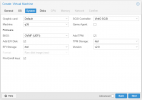Happy Friday all!
I've been running Windows 11 on Proxmox ever since it was available and had no issues until the last 2 months.
Since the September update, I was not been able to update Windows 11 for no obvious reason.
It seemed to me a Windows-specific issue, but then after some troubleshooting, I tried to fix it and got an error "The processor isn't supported for this version of Windows". And then I realized that it can be related to some changes in how VM is configured.
My config looks like this:
agent: 1
balloon: 4096
bios: ovmf
boot: order=sata0;ide2;net0;ide0
cores: 4
cpu: kvm64
efidisk0: VMs:vm-107-disk-0,efitype=4m,pre-enrolled-keys=1,size=4M
ide0: local:iso/virtio-win-0.1.208.iso,media=cdrom,size=543390K
ide2: local:iso/Win11_English_x64.iso,media=cdrom
machine: pc-q35-6.0
memory: 24576
name: windows11
net0: e1000=62:32:F2:2E:E5:EE,bridge=vmbr0,firewall=1
numa: 0
onboot: 1
ostype: win10
sata0: VMs:vm-107-disk-1,size=120G
scsihw: virtio-scsi-pci
smbios1: uuid=41eafb1f-ae54-4cb4-aeca-4424b4d49264
sockets: 3
tpmstate0: VMs:vm-107-disk-2,size=4M,version=v2.0
vga: virtio,memory=256
Anybody has seen such an issue and can hare some clues?
Thanks in advance!
I've been running Windows 11 on Proxmox ever since it was available and had no issues until the last 2 months.
Since the September update, I was not been able to update Windows 11 for no obvious reason.
It seemed to me a Windows-specific issue, but then after some troubleshooting, I tried to fix it and got an error "The processor isn't supported for this version of Windows". And then I realized that it can be related to some changes in how VM is configured.
My config looks like this:
agent: 1
balloon: 4096
bios: ovmf
boot: order=sata0;ide2;net0;ide0
cores: 4
cpu: kvm64
efidisk0: VMs:vm-107-disk-0,efitype=4m,pre-enrolled-keys=1,size=4M
ide0: local:iso/virtio-win-0.1.208.iso,media=cdrom,size=543390K
ide2: local:iso/Win11_English_x64.iso,media=cdrom
machine: pc-q35-6.0
memory: 24576
name: windows11
net0: e1000=62:32:F2:2E:E5:EE,bridge=vmbr0,firewall=1
numa: 0
onboot: 1
ostype: win10
sata0: VMs:vm-107-disk-1,size=120G
scsihw: virtio-scsi-pci
smbios1: uuid=41eafb1f-ae54-4cb4-aeca-4424b4d49264
sockets: 3
tpmstate0: VMs:vm-107-disk-2,size=4M,version=v2.0
vga: virtio,memory=256
Anybody has seen such an issue and can hare some clues?
Thanks in advance!


